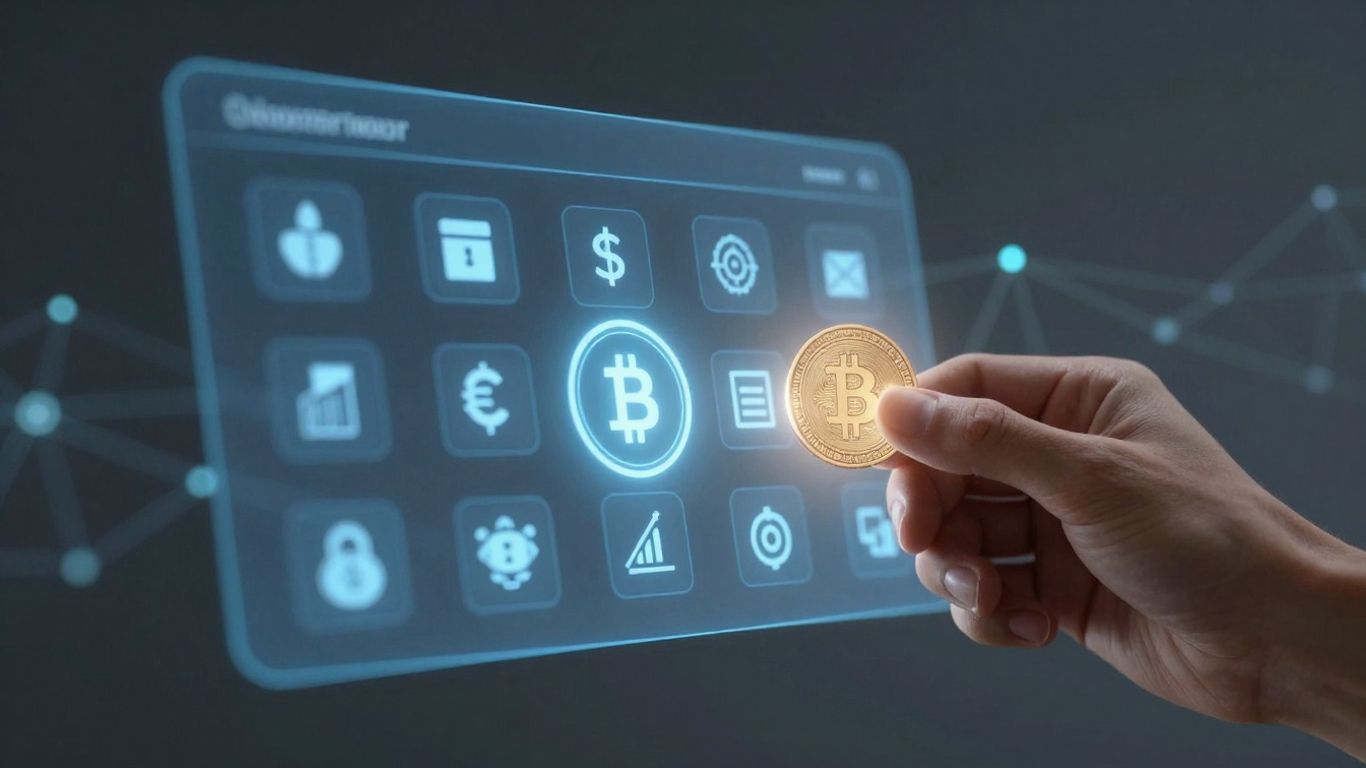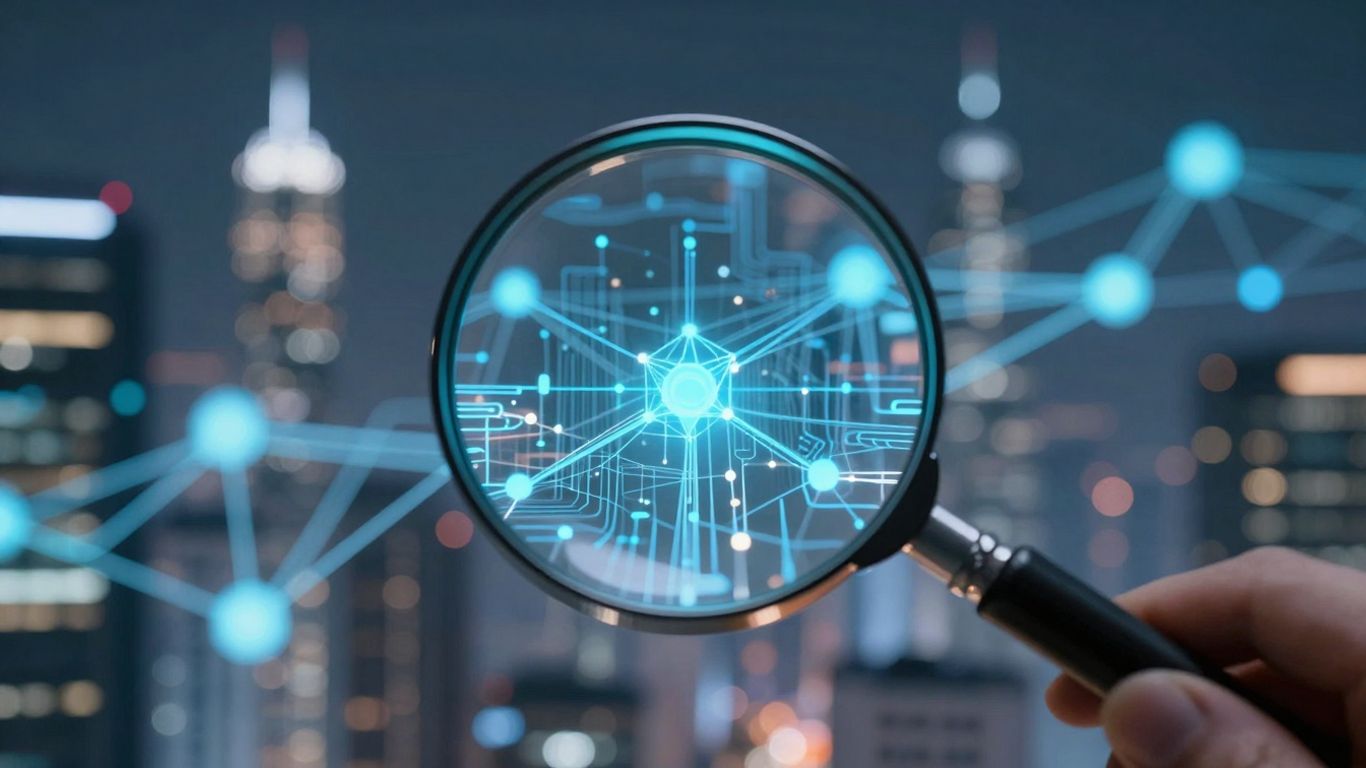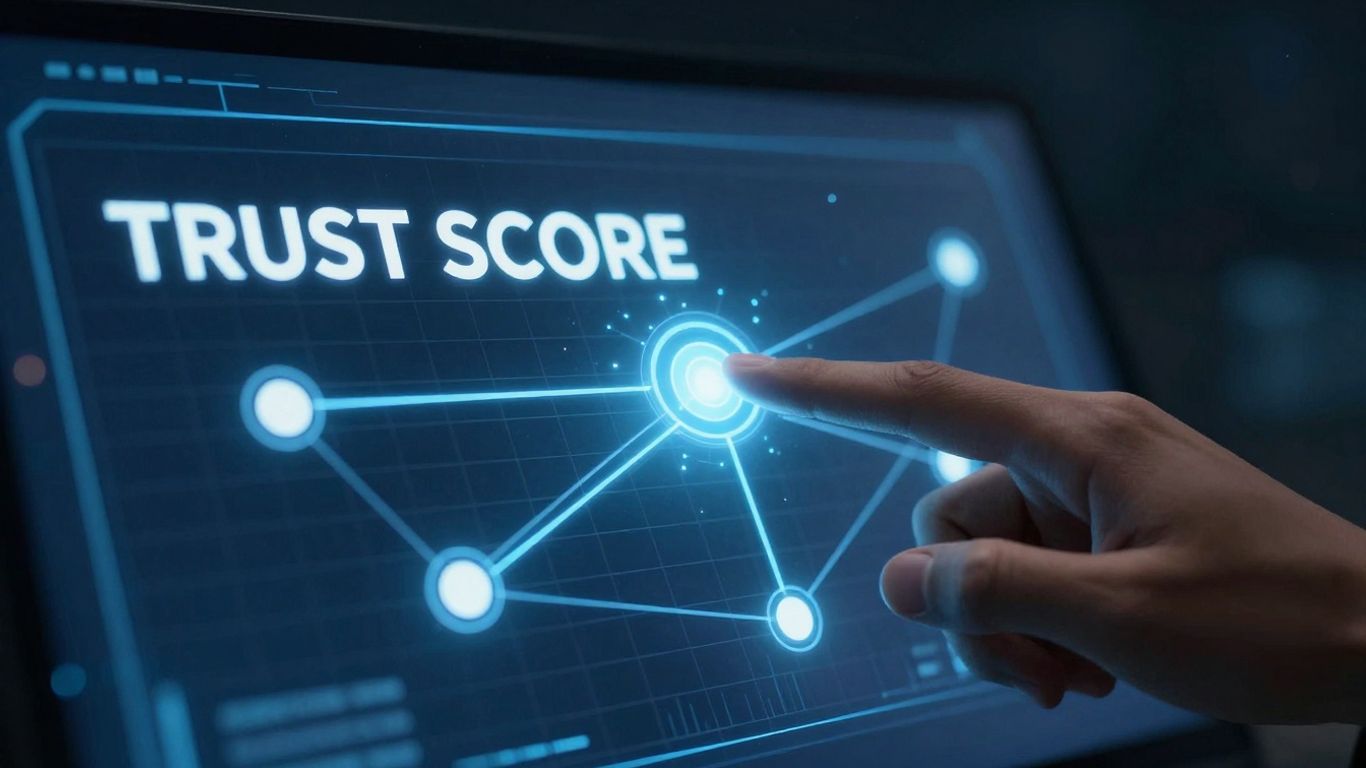[ newsletter ]
Stay ahead of Web3 threats—subscribe to our newsletter for the latest in blockchain security insights and updates.
Thank you! Your submission has been received!
Oops! Something went wrong. Please try again.
Explore how blockchain in auditing is transforming finance. Discover enhanced transparency, efficiency, and the future of audit practices.





So, blockchain in auditing. It's a hot topic, and for good reason. Think about it: our financial records have always been a bit of a mess, right? Lots of paper, lots of chances for mistakes or, let's be honest, some sneaky changes. But this new tech, blockchain, it's like a super secure digital ledger. It’s changing how we keep track of money and how we check if everything is above board. We're going to look at how this whole blockchain in auditing thing works and why it matters for everyone involved in finance.
Think about how we've always done accounting. It's been a lot of manual work, right? Lots of paper, lots of different systems that don't always talk to each other. Well, blockchain is shaking all of that up. It's like moving from a bunch of scattered notes to one super-organized, unchangeable notebook that everyone can see and trust.
This is a big one. Blockchain creates records that, once written, can't be changed or deleted. Imagine a transaction happening – it gets recorded, verified by a network, and then it's there forever, linked to everything that came before it. This makes financial data incredibly secure and trustworthy. No more worrying about someone secretly altering a number to hide something. It’s a fundamental shift in how we think about data integrity.
Because the records are so solid and transparent, a lot of the old, tedious work can be automated. Think about things like reconciliations or checking if everything adds up. Smart contracts, which are basically agreements written in code, can handle a lot of these tasks automatically. This means fewer errors, less manual effort, and ultimately, lower costs for businesses. It’s about making things run smoother and faster.
For auditors, this is a game-changer. Instead of digging through piles of documents and trying to piece things together, they can access a clear, verifiable history of every transaction. They can see exactly what happened, when it happened, and that it hasn't been messed with. This makes the whole audit process much more efficient and reliable. It’s about giving auditors direct access to a single source of truth, which you can read more about in financial reporting and auditing.
The core idea is creating a shared, unalterable history of financial activity that builds confidence and simplifies verification for everyone involved.

Think about how audits used to be done. Lots of paper, lots of checking and double-checking, and a whole lot of time spent just trying to make sure everything added up. It was a bit like trying to find a needle in a haystack, honestly. But now, with blockchain, things are changing, and it's pretty significant.
This is a big one. Blockchain creates a record of transactions that's really hard to mess with. Once something is on the chain, it's pretty much there for good. This means auditors can actually see the whole history of a transaction, from start to finish. It’s like having a super clear, unerasable audit trail. This makes it much easier to spot anything that looks out of place or potentially fraudulent. The ability to trace every step of a financial event provides a level of clarity that traditional methods just couldn't match.
Instead of waiting for reports or digging through old files, auditors can now get access to financial data as it's happening. Because the data on the blockchain is already verified and shared across the network, auditors don't have to spend as much time confirming its accuracy. They can look at the numbers and trust that they're looking at the real deal. This speeds things up considerably and lets auditors focus on analyzing the information rather than just verifying it.
Remember all those repetitive tasks auditors used to do? Like checking if invoices matched purchase orders, or making sure payments were recorded correctly? Blockchain, especially with things like smart contracts, can automate a lot of that. Smart contracts are basically agreements written in code that run themselves when certain conditions are met. This means a lot of the manual checking can be done automatically. It’s not just about making things faster; it’s about reducing the chance of human error and freeing up auditors to do more complex, analytical work. This shift means audits can be done more often and with greater accuracy, leading to significant efficiency gains for everyone involved.
It feels like just yesterday we were talking about how blockchain was this niche thing for Bitcoin, right? But now, it's really changing how we think about accounting and auditing. Traditional methods, with all their paperwork and manual checks, are starting to look pretty old-fashioned. Blockchain offers this whole new way of doing things, a decentralized system that makes financial records way more solid.
Remember double-entry accounting? It's been the standard for ages. Blockchain is pushing us towards something called triple-entry accounting. Basically, it adds a third, cryptographically secured entry to every transaction. This isn't just a minor tweak; it means that every transaction is automatically verified and recorded on a shared ledger. Think about it: instead of just debit and credit, you have a third entry that confirms the transaction across multiple parties' ledgers simultaneously. This makes things incredibly transparent and cuts down on a lot of the back-and-forth reconciliation that auditors usually have to do.
What's really interesting is how blockchain plays with other new tech, especially Artificial Intelligence (AI). When you combine blockchain's secure, verifiable data with AI's analytical power, you get some serious audit upgrades. AI can sift through the massive amounts of data on a blockchain much faster than any human could. It can spot patterns, anomalies, or potential fraud that might otherwise be missed. This partnership means auditors can spend less time on tedious data collection and more time on the really complex stuff, like strategic analysis and risk assessment.
While we often talk about blockchain in terms of financial transactions, its applications are spreading. We're seeing it used for tracking supply chains, managing digital identities, and even voting systems. In auditing, this means auditors might need to look beyond just the numbers. They might be asked to verify the integrity of data in a supply chain or ensure that digital records are authentic. This broadens the scope of what an audit entails and requires auditors to develop new skill sets to handle these diverse data sources. It's a big shift from just checking ledgers to verifying the entire lifecycle of information.
The move towards blockchain in auditing isn't just about making things faster; it's about fundamentally changing the nature of trust and verification in financial reporting. It's a move towards a system where data integrity is built-in, not just checked after the fact.
While the idea of using blockchain in auditing sounds pretty great, getting it to work everywhere isn't exactly a walk in the park. There are a few hurdles we need to jump over before it becomes standard practice.
One of the big issues is how well blockchain networks can handle a massive amount of data. As more companies start using it, the networks need to be able to process transactions quickly and efficiently. Right now, some blockchains can get a bit bogged down, which isn't ideal when you need fast audit results. Plus, different blockchain systems don't always talk to each other easily. This lack of interoperability means getting data from one system to another can be a real headache, making it tough to get a complete picture.
The rules around blockchain are still being figured out. Governments and financial bodies are trying to keep up with this new technology, and that means the regulations can change. This uncertainty makes it tricky for businesses and auditors to know exactly what they need to do to stay compliant. It’s like trying to build something when the building codes keep changing.
The evolving nature of regulations means that staying informed and adaptable is key for any organization looking to implement blockchain solutions in their audit processes.
Let's be honest, most auditors and finance professionals didn't learn about blockchain in school. There's a need for training and education so people understand how this technology works and how to use it effectively in their jobs. Without the right skills, adopting blockchain becomes a lot harder. It's not just about understanding the tech itself, but also how to apply it to audit procedures and interpret the data it provides. Companies like Walmart have shown how powerful it can be, but they also invested in training their teams.
So, what does all this blockchain stuff mean for the folks who actually do the auditing? It's a big question, and honestly, it's not about robots taking over. Think of it more like getting a super-powered assistant. Blockchain isn't here to replace auditors; it's here to change how they work, making their jobs more about analysis and less about tedious checking.
Instead of spending days sifting through paper trails or endless spreadsheets, auditors will have access to a shared, unchangeable ledger. This means a lot of the grunt work, like verifying individual transactions or checking for simple errors, can be handled by the technology itself. This frees up auditors to focus on the bigger picture. They can spend more time understanding the business, identifying risks that aren't just about numbers, and providing strategic advice.
With blockchain handling the data integrity and basic verification, auditors can shift their attention to more complex tasks. This includes:
Even with all this tech, there's still a huge need for human insight. Blockchain provides data, but it doesn't inherently understand context or intent. Auditors will still need to apply their professional judgment to interpret the data, assess the implications of findings, and make decisions about the fairness of financial statements. For example, a transaction might be perfectly recorded on the blockchain, but an auditor's judgment is needed to determine if it represents a genuine business activity or something more questionable.
The shift means auditors will need to be comfortable with technology, but more importantly, they'll need to be sharp critical thinkers. The ability to ask the right questions and understand the 'why' behind the data will become even more important than ever before.

When we talk about finance and especially auditing, trust is pretty much everything, right? Traditional systems have always had their weak spots, leaving room for questions and sometimes, outright manipulation. But blockchain? It's changing the game by making things way more open and honest.
Think of a blockchain as a shared notebook that everyone in a network can see, but no one can erase or scribble over past entries. Every financial transaction gets recorded, verified by multiple people, and then added to the chain. This means that once something is in there, it’s permanent. This immutability is a big deal for accountability. If a transaction happened, it’s recorded for good, and everyone involved knows it. This makes it much harder for anyone to hide or alter financial activities. It’s like having a permanent, tamper-proof record of everything that’s gone on.
Often, in business, some people know more about the financial situation than others. This is called information asymmetry, and it can lead to problems. Blockchain helps fix this by giving everyone who needs access the same, up-to-date information. Auditors, investors, and even regulators can look at the same ledger. This shared view means fewer surprises and a more level playing field. For instance, companies like Walmart have used blockchain to track products, cutting down tracing time from days to seconds, which shows how much clearer things can get [d4ad].
Because blockchain is decentralized, it doesn't rely on a single point of failure. If one computer or server goes down, the whole system keeps running. This makes the financial system more robust and less prone to disruptions. It also means that data is more secure and less likely to be lost or corrupted. This distributed nature builds a stronger, more reliable financial world for everyone involved.
The shift to blockchain in auditing isn't just about new technology; it's about fundamentally rethinking how we establish and maintain confidence in financial reporting. It moves us towards a system where verifiable truth is built into the process itself, rather than being something we have to painstakingly uncover.
Here’s a quick look at how blockchain improves things:
So, where does all this leave us? Blockchain isn't just some tech buzzword anymore; it's really changing how we handle money and keep track of it. For auditors, this means less time spent on tedious checks and more time on actual analysis. Sure, there are still hurdles to jump over, like making sure everything scales up and figuring out all the rules. But the shift towards more open, secure, and efficient financial records is already happening. It’s going to take some getting used to, and professionals will need to learn new skills, but the future of auditing looks a lot more streamlined and trustworthy thanks to this technology.
Think of blockchain as a super secure digital notebook shared among many people. Every time something happens, like a sale or a payment, it's written down in this notebook. Once it's written, it can't be erased or changed, making it really trustworthy. This is great for accounting because it means all financial records are accurate and can't be messed with, making audits much easier.
Because blockchain is like a shared, unchangeable record book, everyone can see the same information. Each new entry is linked to the one before it using special codes, creating a chain. If someone tried to change an old entry, the codes wouldn't match, and everyone would know something was wrong. This makes the records super secure and reliable.
Yes, definitely! Instead of auditors spending lots of time searching through piles of papers or old computer files, blockchain gives them direct access to clear, verified records. This means they can check things much quicker and with fewer mistakes. Plus, some repetitive tasks can be done automatically using smart contracts, which are like programmed instructions on the blockchain, saving time and money.
It's more likely that blockchain will change their jobs, not replace them. Think of it as giving them better tools. Accountants and auditors will still be needed for their smart thinking, to understand complex situations, and to make important judgments. Blockchain can handle the routine checking, freeing up professionals to focus on more important analysis and advice.
There are a few hurdles. Sometimes, different blockchain systems don't talk to each other easily, which can be tricky. Also, the rules and laws about using blockchain are still being figured out, which can make companies hesitant. Lastly, people need to learn how to use these new tools, so there's a need for more training and education in this area.
Right now, most accounting uses 'double-entry,' where every transaction has a debit and a credit. Blockchain can add a 'third entry' that is automatically recorded on the shared ledger. This third entry acts as a verifiable proof of the transaction, making it even more secure and transparent than the traditional system.


